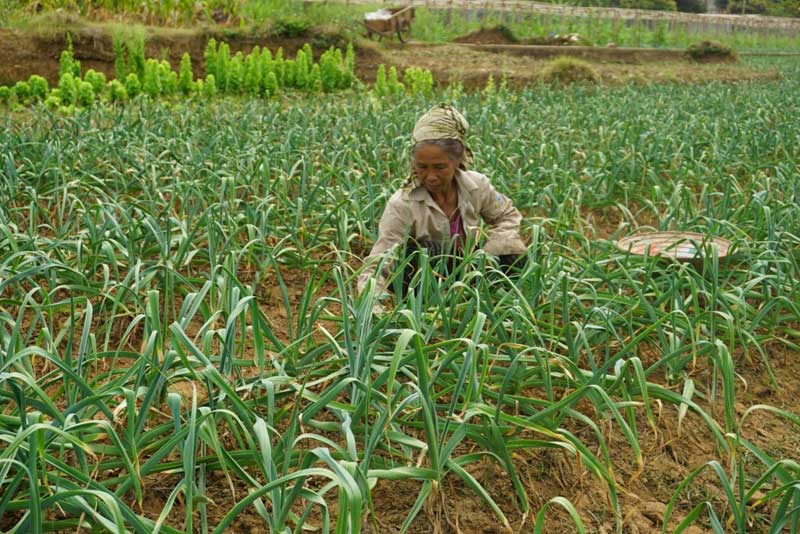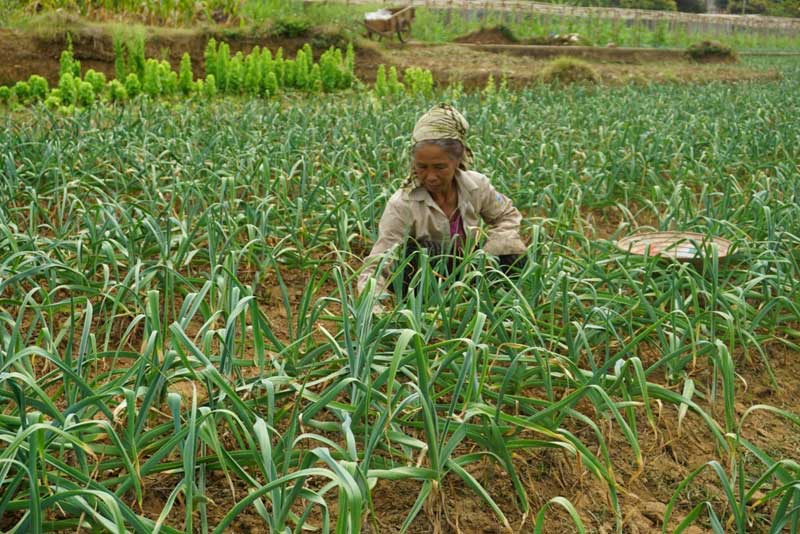
(HBO) – Building chain agricultural production models is a new way to help farmers sustainably improve products’ value. In particular, as Mai Chau district’s agricultural sector is on small scale, linkage is very necessary, especially manufacturing in value chain in tandem with branding. Under the chain agricultural development policy, Mai Chau district has carried out two projects on growing garlic and quash using funding from the national target programme on new rural development in Mai Hich commune since 2017.
Accordingly, participating
households received State support with 70 percent of seedlings and varieties, 5
percent of fertilisers, and training courses on plant growth periods. An automatic
irrigation system have been built to serve three hectares of safe vegetables in
Hai Son hamlet, 56 percent of the project’s cost will be sourced from the local
budget and the remaining for workforce was from farming households.
These are value chains linking
farmers with businesses which will be responsible for the supply of seedlings,
intensive farming guidance, pest control and consumption.

Farmers in Ngoa hamlet, Mai Hich
commune, Mai Chau district grow garlic in value chain to bring economic efficiency.
The Luong Phu cooperative has
signed a contract on the supply of materials (seedlings, chemical fertilisers,
pesticides) and a garlic and quash consumption contract with farming
households.
The Anh Tu Cao Phong clean
orange cooperative has sealed a contract on building an automatic watering
system for vegetables. The two cooperatives are competent enough to meet
requirements set forth in the projects.
The agricultural and forestry
encouragement stations built a technical process for garlic and squash farming
that suits local conditions and held training courses for farming households.
Economic efficiency for garlic is estimated at
22 tonnes of fresh garlic per ha, earning 330 million VND per hectare at a retail
price of 15,000 VND per kg for 330 million VND per ha. The cost is 164 million
VND per hectare while the profit tops 165 million VND per hectare. Quash yields
43 tonnes per hectare at a retail price of 4,000 VND per kg, earning 172
million VND per hectare. The cost surpasses 81 million VND per hectare and the
profit nears 90 million VND per hectare.
According to data from the Hoa Binh Provincial Party Committee, the industrial production index for the first six months of 2025 is estimated to have increased by 20% compared to the same period last year. This marks the highest year-on-year growth rate for this period since 2020.
In the first six months of 2025, Hoa Binh province’s export turnover was estimated at 1.145 billion USD, marking an 18.11% increase compared to the same period in 2024. Import turnover was estimated at $ 804 million, a 17.15% increase, which helped the province maintain a positive trade balance.
The lives of the ethnic minority farmers in Tan Lac district have gradually improved thanks to the new directions in agricultural production. This is a testament to the collective strength fostered through the professional associations and groups implemented by various levels of the district’s Farmers’ Union.
With the motto the "product quality comes first,” after nearly one year of establishment and operation, Muong village’s Clean Food Agricultural and Commercial Cooperative, located in Cau Hamlet, Hung Son Commune (Kim Boi district), has launched reputable, high-quality agricultural products to the market that are well-received by consumers. The products such as Muong village’s pork sausage, salt-cured chicken, and salt-cured pork hocks have gradually carved out a place in the market and they are on the path to obtaining the OCOP certification.
In the past, the phrase "bumper harvest, rock-bottom prices" was a familiar refrain for Vietnamese farmers engaged in fragmented, small-scale agriculture. But today, a new spirit is emerging across rural areas of Hoa Binh province - one of collaboration, organisation, and collective economic models that provide a stable foundation for production.
Maintaining growing area codes and packing facility codes in accordance with regulations is a mandatory requirement for agricultural products to be eligible for export. Recently, the Department of Agriculture and Environment of Hoa Binh province has intensified technical supervision of designated farming areas and packing facilities to safeguard the "green passport" that enables its products to access international markets.



